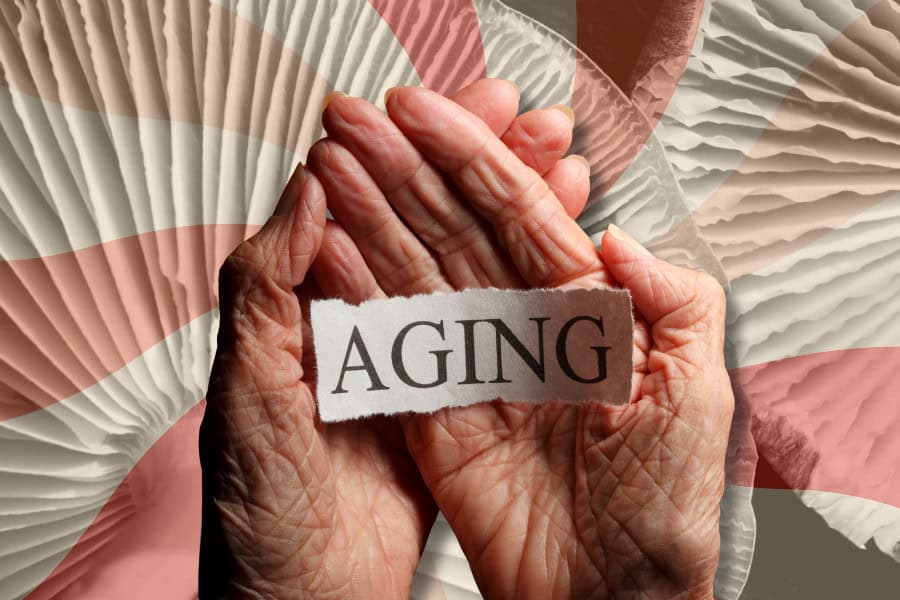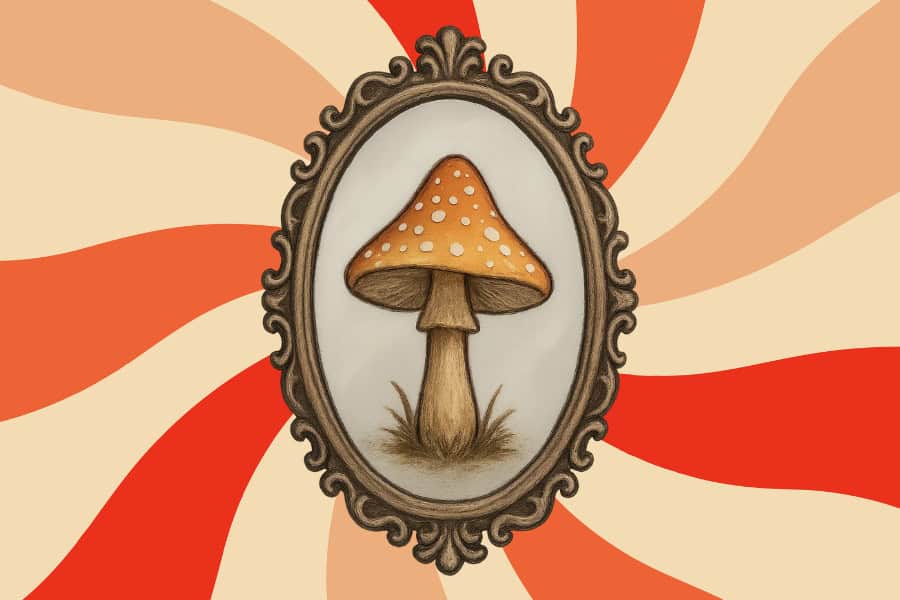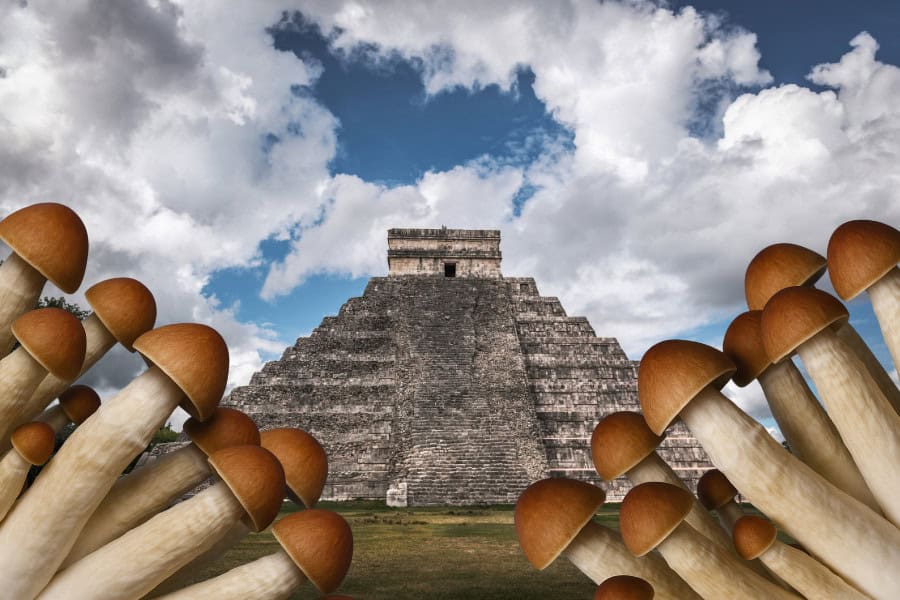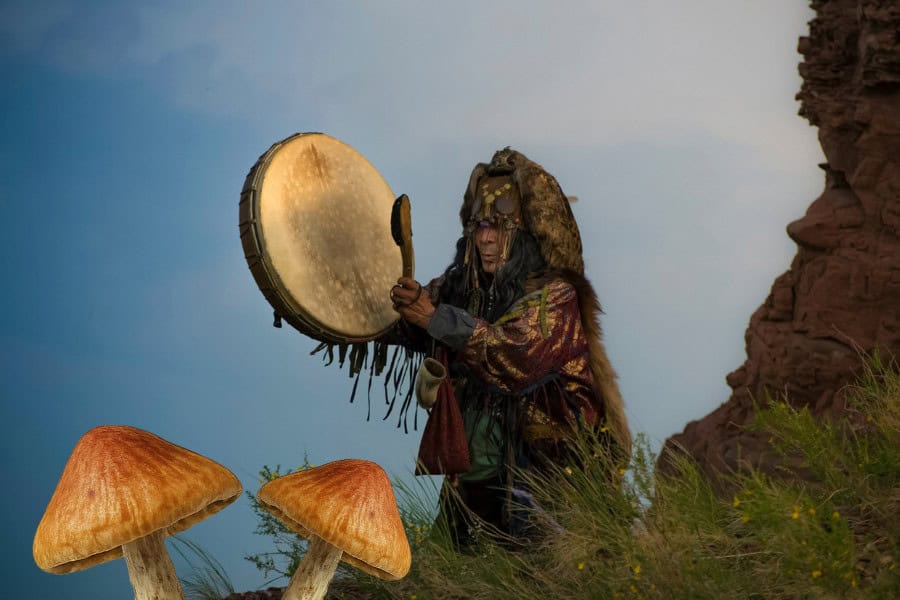Could Psilocybin Hold the Key to Healthier Aging?

Scientific interest in aging has expanded beyond lifestyle and genetics to include compounds that influence how cells respond to stress and repair over time. Recent preclinical research has raised questions about whether psilocybin, a naturally occurring compound found in certain mushrooms, may affect biological processes linked to longevity. These early findings sit at the intersection of neuroscience, cellular health, and modern wellness research.
Psilocybin beyond mental health research
Psilocybin is best known for its psychological effects and its investigation in clinical settings related to mood disorders, trauma, and addiction. In recent years, researchers have begun examining whether its influence extends beyond the brain to broader physiological systems.
Laboratory studies now suggest that psilocin, the active metabolite produced when psilocybin is processed in the body, may interact with cellular pathways involved in aging. This shift in research focus has opened discussion about how compounds traditionally studied for mental health could influence whole-body resilience.
Cellular aging and laboratory findings
In controlled experiments, researchers exposed human lung and skin fibroblast cells to psilocin and observed how long the cells maintained normal function before entering senescence. Compared to untreated samples, treated cells continued dividing for a significantly longer period.
These findings indicate that cellular aging markers were delayed, suggesting improved durability at the cellular level. While these results do not confirm effects in humans, they provide a measurable framework for understanding how aging may be influenced at its earliest biological stages.
Animal research and longevity indicators
To explore whole-organism effects, scientists conducted long-term observations in older mice. Over several months, treated mice demonstrated higher survival rates than untreated counterparts. Physical indicators such as coat quality and activity levels also appeared more robust in the treated group.
Although animal models cannot directly predict human outcomes, they are often used to identify patterns worth studying further. These results support continued investigation into how psilocybin-related compounds may interact with aging biology.

Proposed biological mechanisms
Several biological pathways have been suggested to explain these observations, though all remain under active study:
- Maintenance of chromosomal end structures associated with cellular stability
- Lower levels of oxidative stress linked to cellular wear over time
- Increased activity of proteins involved in stress response and repair
- Improved indicators of DNA integrity during cell replication
Researchers emphasize that these mechanisms are interconnected and complex, requiring further validation through human-focused studies.
Why longevity research draws attention
Longevity science focuses not only on extending lifespan but also on preserving function, mobility, and cognitive clarity with age. As populations live longer, interest has grown in interventions that support healthier aging rather than simply delaying mortality.
In urban research and wellness communities such as Toronto, Mississauga, and Brampton, conversations increasingly connect aging, mental health, and preventive science within a broader quality-of-life framework.
Access, formats, and responsible curiosity
As interest grows, many people seek educational information about different formats and sourcing options. Those researching the topic often start by learning about available products when they buy shrooms for personal study or academic interest.
Others explore alternative formats, including edible options such as shroom chocolate, which are commonly discussed for their predictable dosing and slower onset. Any exploration should remain grounded in legal awareness, moderation, and evidence-based expectations.
Limitations and unanswered questions
It is important to note that current findings are preclinical. Human trials are required to determine whether similar effects occur in people and under what conditions. Questions remain around dosage, frequency, long-term safety, and whether delayed cellular aging could carry unintended risks.
Researchers also stress that aging is influenced by many factors including genetics, environment, diet, and activity. No single compound is likely to offer a complete solution.
Looking ahead
The idea that psilocybin may influence aging biology represents an emerging area of scientific curiosity rather than established practice. Early results suggest it may interact with foundational cellular systems, prompting new questions about how mental health research and longevity science might overlap.
As research progresses, these findings encourage a broader conversation about aging that integrates mental well-being, physical resilience, and responsible scientific exploration. For now, psilocybin’s role in longevity remains a hypothesis supported by early evidence and ongoing study.
In a fast-paced, always-on world, productivity has become a major focus for students, creatives, and professionals alike. Many people are searching for sustainable ways to improve focus, manage stress, and stay mentally flexible without burning out. One approach that has gained attention in recent years is microdosing psilocybin mushrooms. Rather than producing a full psychedelic experience, microdosing is often described as a way to support clarity, motivation, and creative flow while staying grounded in daily responsibilities.
What microdosing means in practice
Microdosing involves taking very small, sub-perceptual amounts of psilocybin, the naturally occurring compound found in certain mushrooms. These doses are intentionally low enough that they do not cause hallucinations or noticeable intoxication. Instead, people report subtle shifts in attention, mood, and perspective that can blend seamlessly into everyday life.
A typical microdose is often described as a fraction of a standard recreational amount. The goal is not to escape reality, but to engage with work and responsibilities in a more focused and balanced way. Many people incorporate microdosing into structured routines, spacing doses out to avoid tolerance and to better observe how it affects their productivity.
How microdosing may support productivity
Scientific research on microdosing is still emerging, but anecdotal reports and early studies suggest several ways it may influence work performance. Rather than acting as a stimulant, microdosing is often described as gently supporting mental states that are already present.
Focus and sustained attention
Some people report that microdosing helps them stay with tasks for longer periods without feeling mentally fatigued. This may be connected to subtle changes in how attention is regulated, making it easier to avoid constant task-switching or distraction.
Creative problem solving
Microdosing is frequently associated with flexible thinking. Users often describe being more open to alternative solutions or seeing connections they might otherwise overlook. This can be especially relevant for creative work, strategy, and complex problem solving.
Emotional regulation and stress management
A calmer emotional baseline can indirectly support productivity. By reducing reactivity or mental tension, some individuals find it easier to approach demanding workloads without becoming overwhelmed or stuck in procrastination loops.
Common microdosing schedules
There is no single standard approach to microdosing. Instead, people experiment with different schedules to find what fits their lifestyle and workload.
Intermittent dosing routines
One widely discussed approach involves dosing once every few days, allowing time between doses for reflection and to prevent tolerance. Others prefer adjusting timing around workweeks or creative projects, keeping careful notes on how each day feels.
Regardless of the schedule, the emphasis is on subtlety. If a dose feels distracting or disruptive, it is generally considered too high for productive use.
Potential limitations and considerations
Microdosing is not a guaranteed productivity solution. Some people notice little to no effect, while others may feel increased restlessness or difficulty sleeping if dosing is too frequent. Long-term research is still limited, and individual responses vary widely.
It is also important to remember that productivity depends on foundational factors such as sleep, nutrition, movement, and workload boundaries. Microdosing is best viewed as a possible complement to healthy habits rather than a replacement for them.
Formats people use for microdosing
Those interested in exploring microdosing often look for consistency and precision. Some prefer working with dried mushrooms, while others choose measured formats designed for ease of use.
Options found in the magic mushrooms category allow individuals to understand traditional formats, while others gravitate toward pre-measured products available through microdose capsule options to reduce guesswork and support routine-based use.
Regional conversations around microdosing
Discussions around microdosing and productivity often surface in large urban centers where work culture is fast-moving and competitive. In cities such as Toronto, Vancouver, and Calgary, conversations tend to focus on balance, harm reduction, and integrating wellness practices into demanding professional lives.
Across these regions, there is growing emphasis on intentional use, self-observation, and avoiding hype-driven expectations.
Is microdosing a good fit for you?
Whether microdosing supports productivity depends largely on personal goals and context. Some people explore it to improve focus, others to unlock creative momentum, and some simply out of curiosity. Keeping a journal, setting clear intentions, and monitoring changes over time can help determine whether it adds value.
It is also important to stay informed about local laws and to approach any psychedelic practice responsibly. Educational resources such as Harvard Health offer broader insight into brain health, focus, and cognitive performance that can complement personal experimentation.
Final thoughts
Microdosing psilocybin has captured attention as a potential productivity-supporting practice, but it is not a shortcut or universal solution. For some, it may gently enhance focus, creativity, or emotional balance. For others, the effects may be minimal or inconsistent.
Approached thoughtfully, microdosing can become part of a larger conversation about working sustainably, protecting mental health, and redefining productivity in a way that supports long-term well-being rather than constant output.
For thousands of years, psilocybin mushrooms have held a central place in the spiritual and healing traditions of many Indigenous cultures. These mushrooms were not viewed as ordinary plants, but as sacred allies believed to open pathways to wisdom, healing, and communication with the spiritual world. Looking at how ancient societies worked with psilocybin helps clarify its cultural meaning and offers valuable perspective as interest grows in its modern use.
Origins of psilocybin use in Indigenous cultures
The ceremonial use of psilocybin mushrooms stretches back thousands of years, particularly in Mesoamerica among the Aztec, Maya, and Mazatec peoples. In Nahuatl, the mushrooms were known as teonanácatl, meaning “flesh of the gods,” reflecting their sacred role in religious life. Archaeological evidence, including stone carvings and ceremonial artifacts, suggests these practices were established well before 1500 BCE and likely passed down through oral tradition even earlier.
Outside of Mesoamerica, psychoactive mushrooms also appeared in other regions. In Siberia, for example, Indigenous groups such as the Chukchi used visionary mushrooms in shamanic rituals. While documentation is more limited, traces of mushroom-based spiritual practices have also been suggested in parts of Africa and Europe where suitable species grew naturally. Across cultures, these fungi were respected as tools for accessing non-ordinary states of awareness.

Ancient evidence and written records
Archaeological findings offer clues to humanity’s long relationship with psychedelics. Cave paintings in the Tassili n’Ajjer region of Algeria, dated to roughly 6000 BCE, depict figures holding mushroom-like shapes, suggesting ritual use. In Central America, ceremonial objects and carvings further support the role of mushrooms in spiritual gatherings.
Written traditions echo these findings. The Rigveda describes a mysterious sacramental drink called Soma, widely believed to have psychoactive properties. In ancient Greece, participants in the Eleusinian Mysteries consumed a ritual beverage known as kykeon, thought by some scholars to have induced altered states of consciousness. Together, these accounts point to a widespread, cross-cultural tradition of using mind-altering substances for spiritual insight.
The role of psilocybin in spiritual and healing practices
Psilocybin’s ability to alter perception and emotion made it a cornerstone of spiritual and healing work. Shamans and healers used these experiences to seek guidance, communicate with ancestors, and restore balance within individuals and communities. The visions and emotional depth produced by psilocybin were understood as meaningful messages rather than random hallucinations.
Psilocybin as a tool for divination
Divination was one of the primary ceremonial uses of psilocybin. Among the Mazatec, nighttime ceremonies guided by a healer were used to seek answers to communal or personal questions. Participants interpreted visions to understand illness, conflict, or future events. Chanting, prayer, and darkness were used to support focus and introspection, reinforcing the sacred nature of the ritual.
Healing and medicine in ancient traditions
Psilocybin was also used as a form of medicine, addressing physical, emotional, and spiritual concerns together. Healers believed illness often stemmed from imbalance or unresolved emotional conflict. Through guided ceremonies, participants confronted inner distress and gained insight into its origins. This holistic approach shares similarities with modern therapeutic interest in psilocybin for emotional well-being.
Ritual structure and ceremonial context
Rituals involving psilocybin were carefully structured and guided. Preparation often included fasting, purification, and setting clear intentions. Mushrooms were consumed in controlled environments such as temples, homes, or natural spaces considered spiritually significant. Music, chanting, and offerings were commonly used to shape the experience.
Community played a central role. Ceremonies emphasized shared understanding and collective healing rather than individual experimentation. This communal framework reinforced respect for the mushrooms and limited misuse.

Archaeological and anthropological insight
Physical evidence of mushroom rituals includes Mesoamerican “mushroom stones” dating from 1000 to 500 BCE, as well as colonial-era accounts describing ceremonial use before Spanish suppression. In the twentieth century, ethnographic research helped preserve surviving traditions, particularly among the Mazatec, where ceremonial use continued quietly despite outside pressure.
These accounts demonstrate that psilocybin use was never casual. It was embedded in systems of ethics, responsibility, and cultural meaning that shaped how the experience was understood and integrated.
Modern reflection and access
Today, many people are rediscovering psilocybin through a modern lens, often seeking personal growth rather than formal ceremony. In cities such as Toronto, Vancouver, and Montreal, conversations around harm reduction and education emphasize learning from Indigenous traditions rather than ignoring them.
Those exploring contemporary formats may encounter options such as dried mushrooms or measured products available through the magic mushrooms category. Others prefer more controlled approaches, including pre-measured options found in microdose capsule formats, which reflect a modern attempt to balance accessibility with consistency.
Final thoughts
The long history of psilocybin mushrooms reveals a legacy rooted in respect, intention, and spiritual inquiry. Indigenous cultures approached these fungi as teachers rather than substances, embedding them within ethical and ceremonial frameworks. As interest continues to grow, understanding this history can help guide more thoughtful and responsible engagement today.
Creative people have long been drawn to altered states as a way to loosen rigid thinking and access fresh ideas. From ancient ceremonial use to contemporary art studios, psilocybin-containing mushrooms continue to be discussed as tools that may encourage imagination, emotional openness, and novel perspectives. Today, this curiosity is increasingly informed by neuroscience, cultural history, and a growing emphasis on responsible, harm-reduction-minded exploration.
The neuroscience behind creativity and psilocybin
Modern brain imaging research suggests that psilocybin temporarily changes how different regions of the brain communicate. In particular, it reduces the dominance of tightly controlled networks associated with habitual thinking, allowing less-connected regions to exchange information more freely. This shift is often linked to cognitive flexibility, pattern recognition, and the ability to form unexpected associations.
Interestingly, studies indicate that while focused, task-based problem solving may dip during an acute experience, many people report a noticeable increase in original ideas and insight in the days that follow. This post-experience “afterglow” appears to support reflective creativity rather than forced productivity.
Historical and contemporary creative influences
Long before laboratory studies existed, Indigenous cultures in Mesoamerica treated mushrooms as sacred tools for vision, storytelling, and symbolic art. Carved stones, murals, and oral traditions suggest these experiences were closely tied to creative and spiritual expression rather than recreation.
In the modern era, musicians, visual artists, and writers have described how psychedelic experiences helped them revisit their work with renewed curiosity. Rather than supplying ideas outright, the value often comes from emotional reframing, reduced self-criticism, and a greater willingness to experiment.
Microdosing and everyday creative flow
Microdosing refers to taking very small, sub-perceptual amounts of psilocybin on an infrequent schedule. Many people explore this approach in hopes of subtle mood support, improved focus, or a smoother creative rhythm without intense psychedelic effects.
Those interested in structured formats often look to options such as microdose capsules, which are designed for consistency and ease of measurement. It is important to note that scientific evidence on microdosing remains mixed, and expectations should stay grounded.
Creative formats and intentional use
Different creative goals may call for different approaches. Some artists prefer reflective journaling or sketching after an experience, while others focus on sensory inspiration such as music or visual design. Edible formats, including products like shroom chocolate, are sometimes chosen for their familiar form and slower onset, which can encourage a more deliberate, intentional pace.
Regardless of format, intention-setting and integration remain central. Writing down insights, revisiting unfinished projects, and allowing time for rest can help translate abstract experiences into practical creative output.
Access, environment, and regional context
Setting plays a major role in shaping any introspective or creative experience. Urban creatives often emphasize quiet, controlled environments that contrast with the pace of city life. In areas such as Toronto, Mississauga, and Vaughan, discussions around mindful use frequently highlight privacy, preparation, and understanding local regulations.
Staying informed about regional laws and prioritizing safety helps ensure that curiosity about creativity does not turn into unnecessary risk.
Safety, balance, and creative responsibility
Psilocybin is not a shortcut to artistic skill, nor is it suitable for everyone. Acute effects can temporarily impair judgment, and individuals with certain mental health conditions should be especially cautious. Creative exploration is best approached gradually, with attention to mental well-being and personal boundaries.
Combining education, intention, and respect for the substance allows creativity to unfold naturally rather than being forced. For many, the real value lies not in the experience itself but in how insights are integrated afterward.
Further reading and external perspectives
- Harvard Health on microdosing and current evidence
- Frontiers review on psychedelics, brain networks, and creativity
Closing reflections
Magic mushrooms continue to occupy a unique space in conversations about creativity, not as miracle tools but as catalysts for reflection and perspective change. When approached with care, education, and realistic expectations, they may support artists and thinkers in reconnecting with curiosity, flexibility, and the quieter dimensions of imagination that everyday routines often suppress.